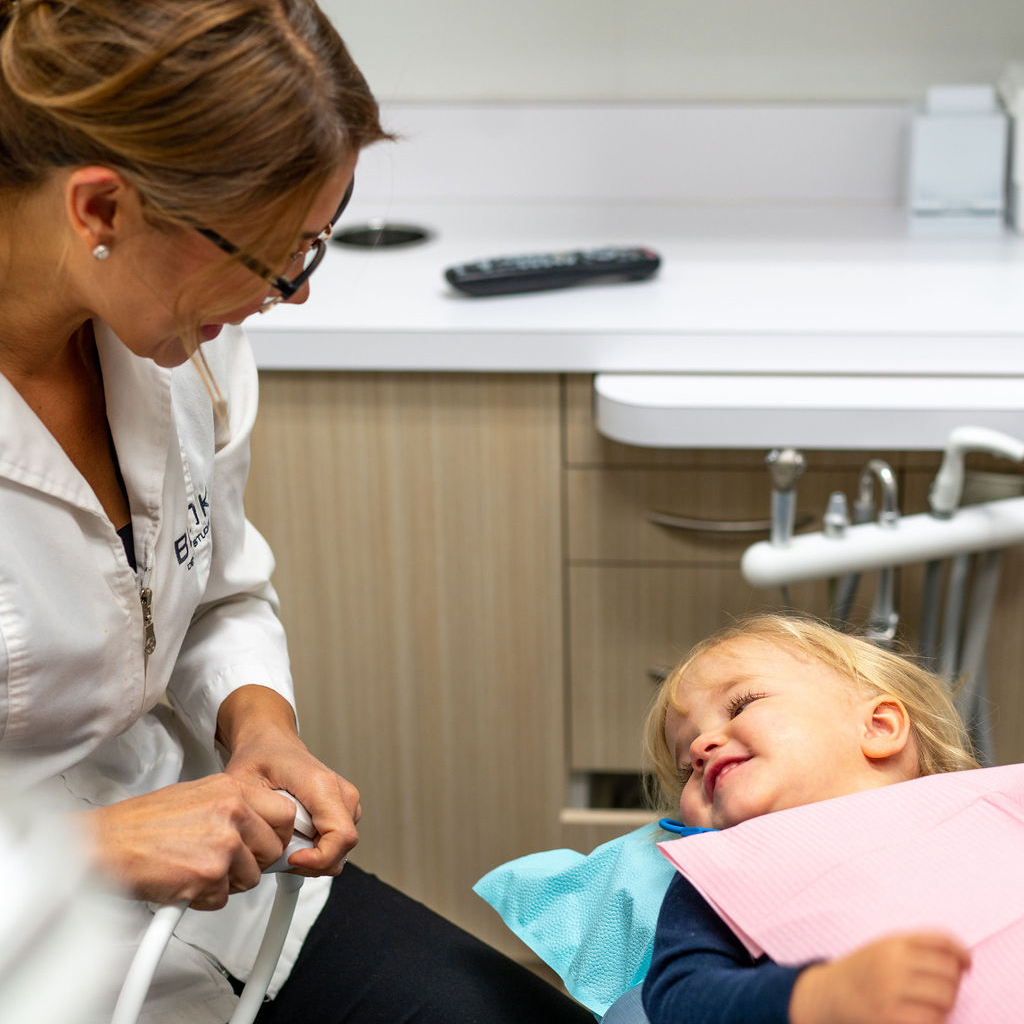
Saskatoon Parents learn about dental development and infant and toddler oral health.
Becoming a parent can be overwhelming with seemingly endless things to consider and learn. In our clinic, we hear from Saskatoon parents-to-be that infant oral health is seldom mentioned in early parenthood circles, books, and support groups. Tooth decay and cavities in young children are preventable, yet they are very common which points to a general lack of information and understanding about the importance of early childhood oral care. We feel that infant oral health is one of the most important and overlooked aspects of raising healthy young ones. We wrote this two-part blog to provide some guidance and essential info that we think all parents should know about early childhood oral care.
The role of baby teeth.
It is a common misconception that baby teeth don’t matter because they only last a few years before the permanent teeth come in. This couldn’t be further from the truth. They are needed for your child to speak and chew at an early age—but their importance goes much beyond this. They serve as placeholders for permanent adult teeth that come later and are essential to the development of our jaws and gums. When these placeholders are jeopardized or missing due to premature tooth decay, adult teeth may come in crowded, overlapping, or misaligned which can cause problems into adulthood and present challenges for the maintenance of lifelong oral health.
Understanding the causes of early childhood cavities.
Tooth decay and cavities in infants and toddlers are primarily caused by nutritional deficiencies. The best prevention is to ensure the nutritional needs for healthy bones and teeth are being met through the diet of both the prenatal mother and breastfeeding mothers and babies after birth. See the WESTON A. PRICE FOUNDATION’s dietary guidelines here. Fat-soluble vitamins A, D, E and K2 are essential for prenatal and postnatal nutrition for both mother and baby. Mom and baby should also be getting collagen and/or gelatin in their diets, and plenty of sunlight for extra vitamin D. This part might be obvious, but dietary sugars should also be reduced or avoided in the diets of both mom and baby—this includes natural sugars in some of the foods most commonly enjoyed by young children such as fruit and fruit juice. Read How To Protect Your Teeth from Sugar Damage for more about the infiltration of sugar in modern diets, how it affects our teeth, and some guidance on making informed shopping decisions to benefit your family’s oral health and overall health. For more on oral health nutrition for infants and toddlers, read here.
Of course, insufficient infant oral hygiene can also lead to early childhood cavities. We also see young children with tooth decay exacerbated by mouth breathing, which alters PH in the mouth and causes microbiome dysbiosis. However, a child who is getting all the nutritional requirements for healthy bones and teeth won’t be as susceptible to cavities caused by these factors. The best way to prevent early childhood tooth decay is by understanding infant nutritional requirements for the development of strong bones and teeth.
Knowing what foods contribute to childhood tooth decay.
Most people know that sugary foods and drinks cause cavities, but most don’t think about simple carbs like refined flour which is digested in the body as sugar and feeds sugar-hungry oral bacteria in a similar way. These cause cavities. Therefore, removing sugar from the diet also means a significant reduction of simple carbs like breads, cereals, pastas, baked goods, pretzels, crackers, chips, fruit and even dried fruit, and fruit juice. Unfortunately, these are some of the most culturally common foods for kids, but introducing them to low-sugar and low-carb alternatives from the get-go will mean less parenting struggle with toddlers craving and asking for these foods.
Tips for Childhood Cavity Prevention
- Reduce exposure to dietary sugars, cereals and fruit juice from infancy.
- Reduce refined flour, grains and crackers.
- Get lots of fat-soluble vitamins, found in full fat, unprocessed whole foods and animal protein.
- Get lots of sunlight for vitamin D absorption.
- Brush baby teeth with non-fluoride or hydroxyapatite toothpastes.
- Floss baby teeth.
- Learn ways to reduce or retrain mouth breathing and get support from your dentist.
 The role of baby teeth.
The role of baby teeth.
It is a common misconception that baby teeth don’t matter because they only last a few years before the permanent teeth come in. This couldn’t be further from the truth. They are needed for your child to speak and chew at an early age—but their importance goes much beyond this. They serve as placeholders for permanent adult teeth that come later and are essential to the development of our jaws and gums. When these placeholders are jeopardized or missing due to premature tooth decay, adult teeth may come in crowded, overlapping, or misaligned which can cause problems into adulthood and present challenges for the maintenance of lifelong oral health.
Understanding the causes of early childhood cavities.
Tooth decay and cavities in infants and toddlers are primarily caused by nutritional deficiencies. The best prevention is to ensure the nutritional needs for healthy bones and teeth are being met through the diet of both the prenatal mother and breastfeeding mothers and babies after birth. See the WESTON A. PRICE FOUNDATION’s dietary guidelines here. Fat-soluble vitamins A, D, E and K2 are essential for prenatal and postnatal nutrition for both mother and baby. Mom and baby should also be getting collagen and/or gelatin in their diets, and plenty of sunlight for extra vitamin D. This part might be obvious, but dietary sugars should also be reduced or avoided in the diets of both mom and baby—this includes natural sugars in some of the foods most commonly enjoyed by young children such as fruit and fruit juice. Read How To Protect Your Teeth from Sugar Damage for more about the infiltration of sugar in modern diets, how it affects our teeth, and some guidance on making informed shopping decisions to benefit your family’s oral health and overall health. For more on oral health nutrition for infants and toddlers, read (insert link for Part 2).
Of course, insufficient infant oral hygiene can also lead to early childhood cavities. We also see young children with tooth decay exacerbated by mouth breathing, which alters PH in the mouth and causes microbiome dysbiosis. However, a child who is getting all the nutritional requirements for healthy bones and teeth won’t be as susceptible to cavities caused by these factors. The best way to prevent early childhood tooth decay is by understanding infant nutritional requirements for the development of strong bones and teeth.
Knowing what foods contribute to childhood tooth decay.
Most people know that sugary foods and drinks cause cavities, but most don’t think about simple carbs like refined flour which is digested in the body as sugar and feeds sugar-hungry oral bacteria in a similar way. These cause cavities. Therefore, removing sugar from the diet also means a significant reduction of simple carbs like breads, cereals, pastas, baked goods, pretzels, crackers, chips, fruit and even dried fruit, and fruit juice. Unfortunately, these are some of the most culturally common foods for kids, but introducing them to low-sugar and low-carb alternatives from the get-go will mean less parenting struggle with toddlers craving and asking for these foods.
Tips for Childhood Cavity Prevention
- Reduce exposure to dietary sugars, cereals and fruit juice from infancy.
- Reduce refined flour, grains and crackers.
- Get lots of fat-soluble vitamins, found in full fat, unprocessed whole foods and animal protein.
- Get lots of sunlight for vitamin D absorption.
- Brush baby teeth with non-fluoride or hydroxyapatite toothpastes.
- Floss baby teeth.
- Learn ways to reduce or retrain mouth breathing and get support from your dentist.

Pediatric dentistry for your child at BLOK Dental
The foundations for lifelong oral health begin during infancy. The Canadian Dental Association recommends your child visit the dentist before the age of one year, or within 6 months of the first tooth’s eruption. Visit our website or get in touch with us to learn more about our dental services for kids, and what to expect at your child’s first dental appointment.

 The role of baby teeth.
The role of baby teeth.